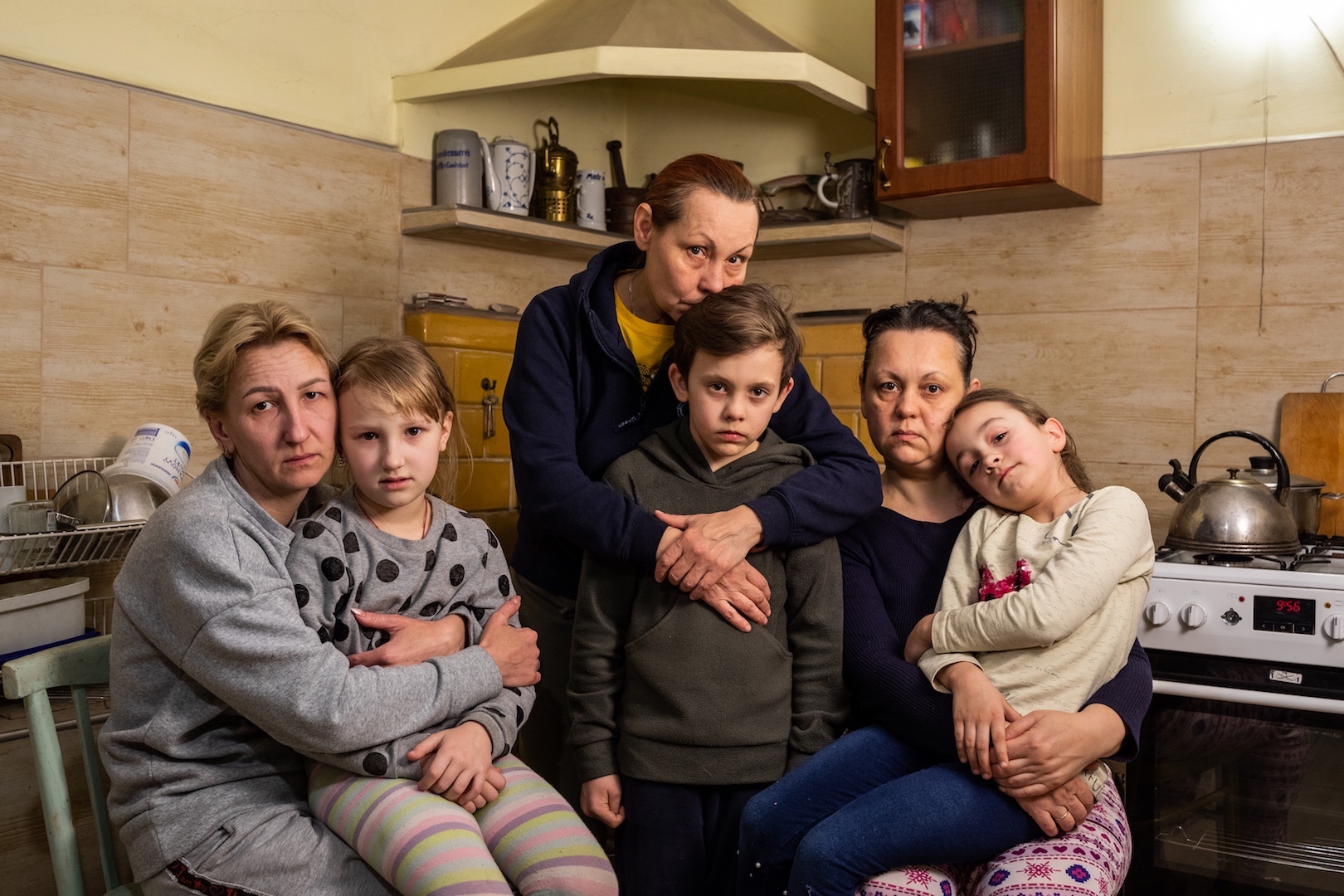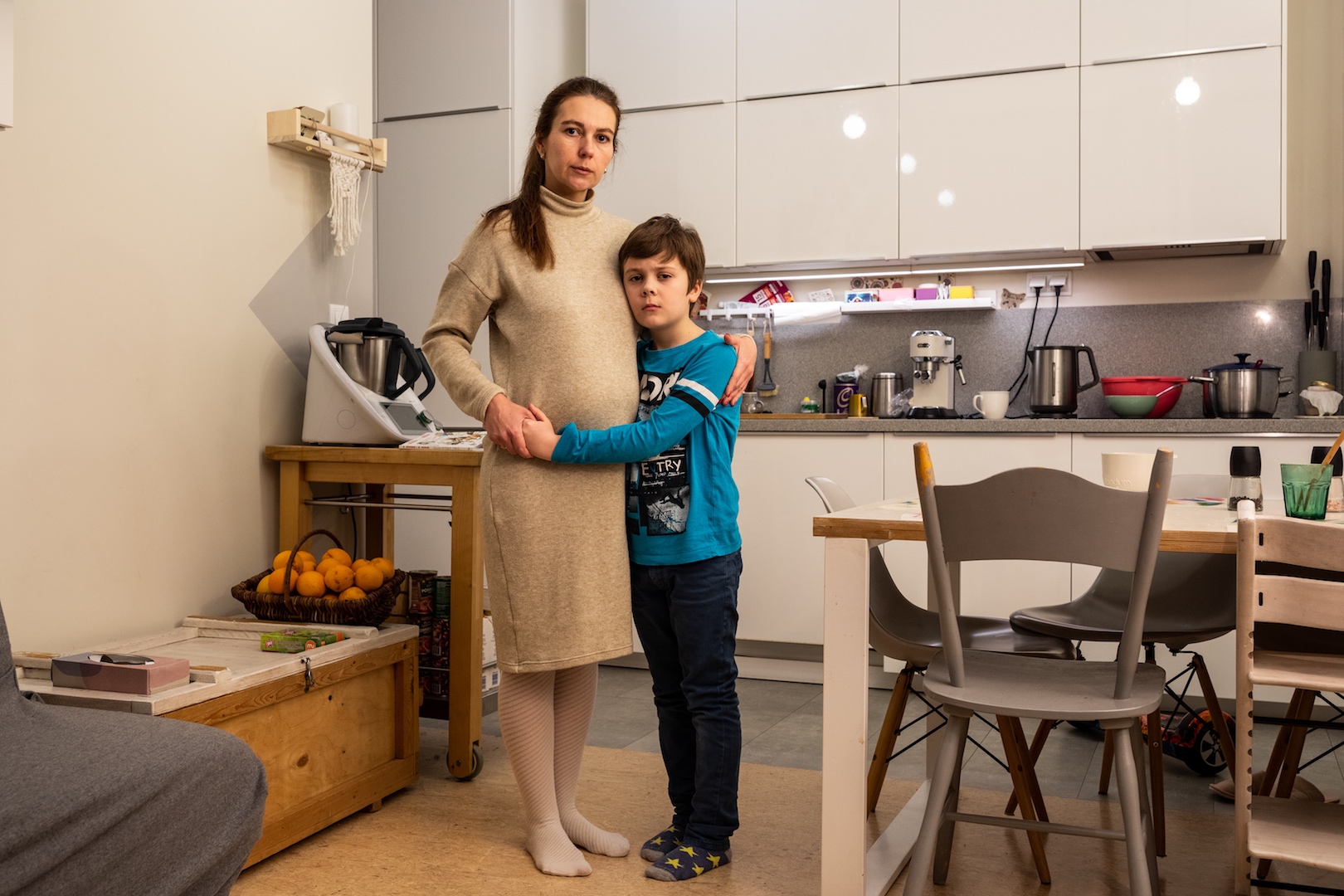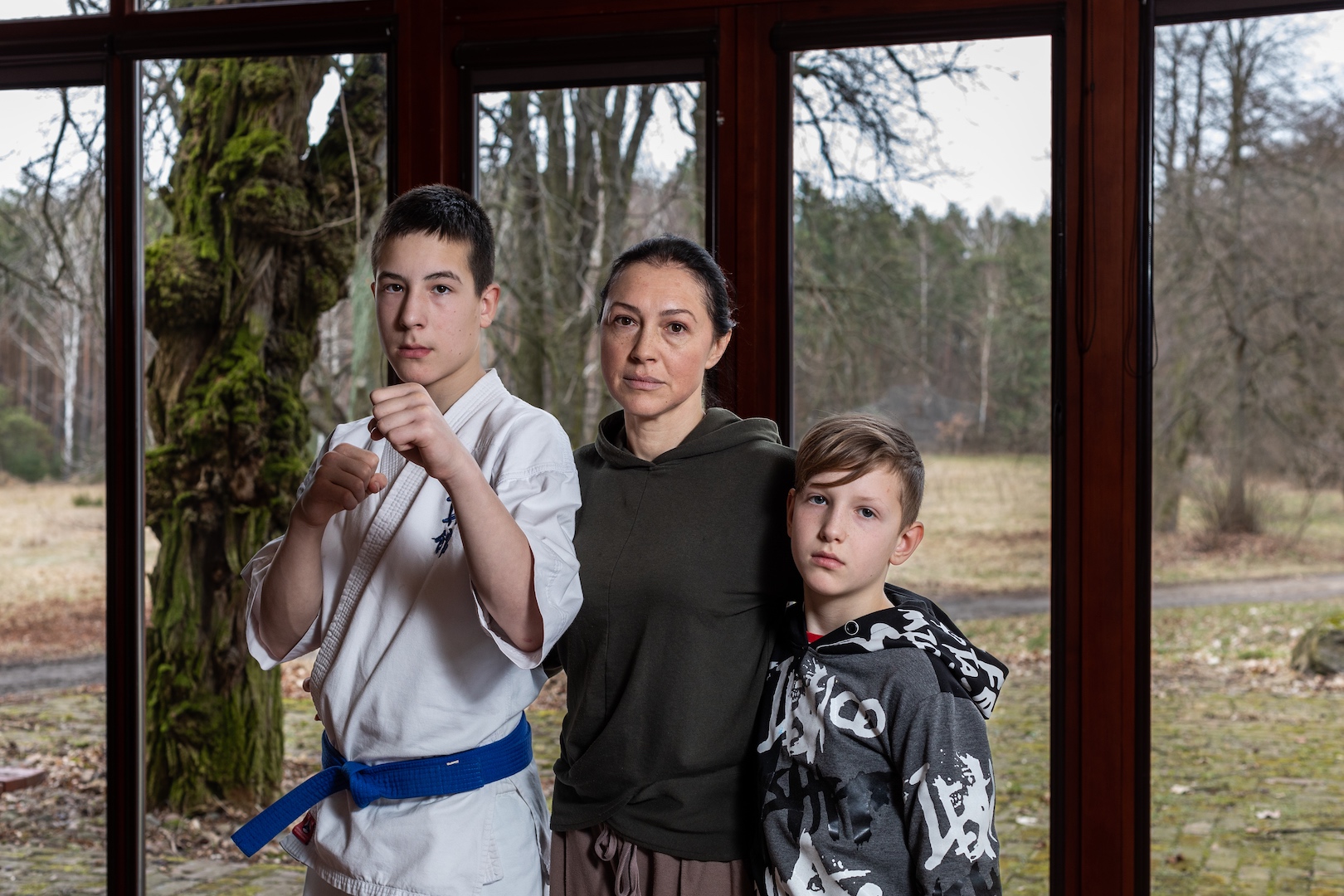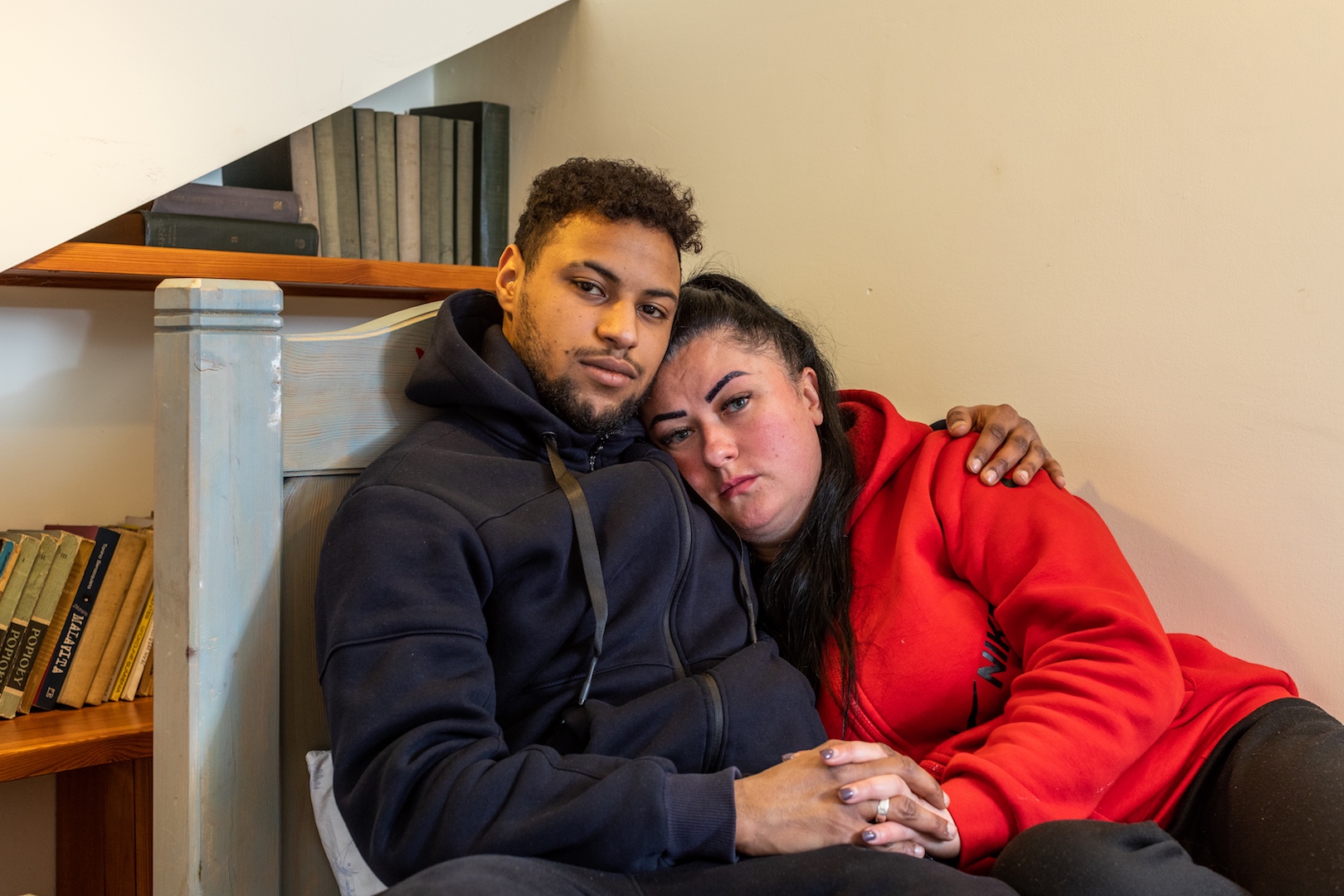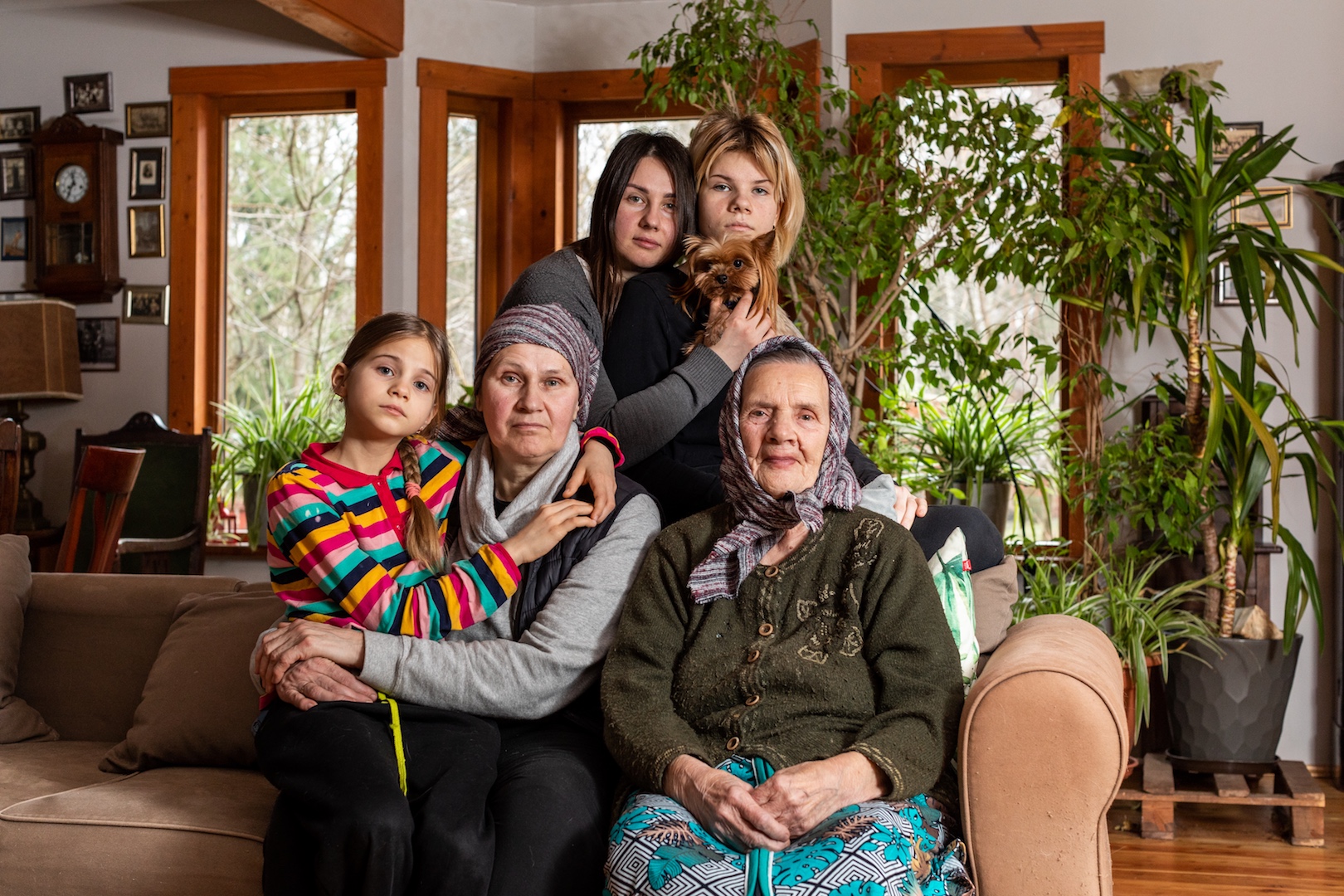Portraits and Testimonies of Ukrainian Refugees, 2022
Piotr Wojcik
From left to right: Olga Verbynska with her daughter Victoria, Albina Gidzinska with her son Matvije, Natalia Komarynec with Katerina. They come from Volodymyr-Volynskyi in western Ukraine.
At Czesław Urlich’s home, the village of Królewiec located 10 km from the Polish city of Kielce.
Albina Gidzinska
“I was working in a sewing company, I used to sew covers for piece of furniture. My son Matvije was at school, and on 24 February, we were ready to go to school when we heard on television that the Russian invasion had begun. My husband and my 25 year old daughter Iryna stayed in Ukraine. My daughter is a volunteer, she helps refugees at the border and also helps our soldiers.”
“At first, we didn’t want to believe it. We watched television and we saw Kiev, Kharkiv, Odessa, Marioupol. It was quiet at home at the time. At the first sirens at home, my sister called me : “Take Matvije and run!” But I was so surprised that I didn’t know where to run. On the third day, around 7.30 in the morning, three rockets hit and my daughter called me : “Mum, take Matvije and run”. She herself was running from the ninth floor to the shelter. I took my bag, called my sister and ran to her house. It was so terrible that I don’t know how to describe it.”
“As we were leaving, my daughter said goodbye to me. She was holding her brother’s hand. I begged her : “Iryna, come with us”. She took my hands and made a sign of the cross. “Mum, someone has to stay here to help. I am preparing food for the men in our division. Mother, they are defending our city ! Don’t worry about me.”
Natalia Komarynec
“On 24 February, in the early morning, we knew that the war had started. Despite that, we stayed in the city. But on 2 March, however, we started to think about whether to stay or go. Sasha my husband et Dima our son are military, they defend our city. My son said : “Mum, go because you have to save Katerina !” and my husband : “Natasha, I beg you, go, save our daughter, our child! He puts us on a bus with his sister and a friend. The children ask why we are leaving and Dad stays. My daughter and I will stay here until my husband calls me and says we can go back because peace has returned.”
“We rarely talk because there is hardly any communication. Many have stayed on site, especially the elderly who could not leave with us. Our mothers, grandmothers, parents are there, we think about them and worry about them.”
“My son and my husband are military, every morning we get up and we don’t know what the day will bring and we are afraid to hear the bell of fear. Yesterday, when we went to bed, the children cried: “Mummy, when are we going home, we want to see daddy”.
Olga Verbynska
“When the sirens kept wailing, we slept in the cellar and the men were on guard to defend the city. After a few days, my husband decided to send us to Poland with our seven-year-old daughter.”
“There is communication problems in Ukraine. Here in Poland we have phone cards but they run out quickly. So we call for a short while, just to hear from the loved ones, if they are alive, if everything is okay.”
“People who flee have no money, credit cards are blocked. Our husbands gave us all the cash they had. We had maybe 300 zlotys (60 euros) each, we exchanged the dollars we had at home. In Ukraine we are not poor, we work. But in times of war, people don’t have time to organize themselves, they flee…”
Olga Fichtchouk and her son Orest.
At the home of Zuzanna Sustakiewicz’s family, Warsaw, Poland.
Olga Fictchouk
“I’m 37 years old. I am a mother. I have a 8 year old son. And now, I’m 6 months pregnant. I live in Kiev. I am a musician, pianist. Thanks to my training, I lead theatre workshops for children. Recently, we staged an excellent musical “School of rock” at the National Theatre on Kontraktowy Square in the centre of Kiev. This was my dream.
I left Kiev the 24 February, the same day the war started. I arrived in Warsaw on 28 February. Before 24 February, the news was worrying and it was becoming increasingly clear that something was going to happen. But nobody would have believed that in the 21st century there could be a war.
On the night of 23 to 24 February we were sleeping when the baby in my belly started kicking me and I woke up very early, around five o’clock. Then I heard the first explosion. My body froze and I woke up my family. There was no time to think, to realize what was happening. To leave, to run away, to save our lives. Save my children. It was my husband who collected a minimum of valuable things we had at home, some money. He put our things in a backpack. To tell the truth, I had no idea what to take. I opened the fridge, took some food for the road. I didn’t know how long we were going to travel or in which direction.
On the way, we decided to go to Poland. We arrived at the border the 24th at 7pm. Until 7am the next day, we line up. In the meantime, we learned that the president had decreed that the men would not be allowed to leave.
Now my husband is in Western Ukraine, helping the volunteers as much as he can. I don’t know exactly what he does, he is very busy. Of course, we are often in contact.”
When we crossed the border, people gave us food. I didn’t have time to notice anything. I was handed sandwiches, tea. It was shocking and at the same time very nice. We were surprised. Ordinary passers-by wanted to help us. It was very emotional, we had tears in our eyes. First I cried because I was afraid, then I cried because it was painful to leave my family, and then I cried with emotion, seeing the solidarity.
My son is called Orest, he is only a child, eight years old is not much. But he understands perfectly what is going on, he is aware of the complexity of the situation. He knows the word “war”. He understands everything.”
Svetlana Kistyniuk and her sons Jan and Georgij.
At the home of Joanna Fidler and Sławomir Sierzputowski, in their agrotourism farm, village of Badowo Kłody 50 km from Warsaw.
Svetlana Kistyniuk
“I live in two cities – Odessa and Novovolynsk. My parents live in Odessa and my parents-in-law in Novovolynsk, in the west near the Polish border. I am a personal sports trainer (coach). I have two sons and they are my greatest successes. My elder son Jan is the Ukrainian champion in kyokushinkai karate and my younger son Georgij is the youngest karate champion. My husband, Sergey Kistyniuk, is a veteran karate champion of Ukraine. We no longer live together. He is now a truck driver.”
“We left the day the sirens were wailing. The children were scared. So we came to Poland. I was very, very lucky, because complete strangers picked me up in their car and brought me here.”
“I left Odessa 6 days ago. We will move to where we can find a sports section for the children.”
“My husband took part in the ATO, the anti-terrorist operation (Ukrainian name for actions in the Donbass). Then, in order to carry out his further rehabilitation, his therapy, I took a special course at the IQholding institution where I worked with Ukrainian military fighting in the Donbass after 2014 and 2015. The lessons were about “Peacetime job search and reintegration of our Ukrainian military”. In Warsaw I will leave my application to the Polish Association of Psychotherapy to work with Ukrainians.”
“I came to Poland only because my ex-husband is here because of his work. From home, from Odessa, all go further across Moldova.”
Anna Barchat and Anjunija Badr
At Joanna Fidler and Slawomir Sierzputowski, in their agrotourism farm, village of Badowo Kłody, 50 km from Warsaw.
Anjunija Badr
“I came to Ukraine to study. I spent 5 years in Ukraine, it was my fifth and last year of study. I studied management at Kharkiv Polytechnic. We decided to flee Ukraine on the fifth day of the war. We endured the first, second and third day. We thought we would stay quietly in the basement because it was safer there. But then it got worse and worse. Explosions, bombings.”
“My parents are afraid. There are in Marocco , they watch the news every day. They see everything on television.”
“You couldn’t get out anywhere. Food was rare, water was rare. You couldn’t buy anything. The shops were closed. As soon as the shops opened, the lines were long. And we had to wait in the street for two or three hours. They were bombing, it could fall on us.”
“The drive from our house to the station took 15 minutes. We saw tanks in the street. Above our heads there was an explosion on the other side of the street. We were lucky. When the taxi was approaching the station, there was an explosion behind us. The car stopped in the middle of the road and we ran away to hide.”
“We have a plane to Morocco today. We are going there. I am going to work at my father’s house. We are going to live in Morocco.”
Anna Barchat
“In Kharkiv I worked in a billiard club for 8 years, until it all started. It was very hard, we took nothing with us, we have nothing. We got on the train and it was a hard journey. There were 200 people in the carriage. Thank god we arrived in Lviv and then at the border. At the border it was easier, because on the Polish side they gave us sandwiches, tea and clothes.
“They bombed all day. At night we couldn’t sleep because we felt that the explosions were next to our house. We hid in the cellar, but all the time there was a bam, bam explosion near our head. Are we gonna wake up today or not. And every day more and more and more and more…”
“After the third day, they started bombing the streets, the houses and the people. Soon there will be no city. I never imagined that I would be in such a war. We were living in peace, nobody expected such a thing. Even when this war is over, I don’t want to go back. I am afraid, it will stay inside me.”
“My father and grandmother are still there. I call them several times a day. They didn’t manage to leave.”
In the foreground, from left to right: Fiłatova Mariana, Samochvalova Svitłana, Walentyna Judenko.
In the background, from left to right: Fiłatova Olha, Fiłatova Oleksandra
At the home of Katarzyna Sikorska-Siudek and Mieczysław Siudek, Wiązowna Kościelna near Warsaw
Filatova Olha
“I am a lawyer, I deal with civil and family matters, I live and work in Kiev.”
“We were at home when we heard a loud explosion behind the window, then several more. We got scared, gathered our things, ran out and fled to a shelter in the basement of a nearby primary school. There were 600 other people in the shelter. We all stood around waiting for the explosions to stop. After about two hours, the explosions stopped and we went home. Every day this happened again, first only at night and then during the day. On the second and third night, when the bombing started again, we took some things, the children, mattresses, and slept in the shelter. We slept without taking off our overcoats, it was very cold. Then a rocket fell on our building and the ones next to it. When we went to bed, we didn’t know if we would still be alive at the end of the night. Finally, we decided to take our things and leave Ukraine.”
“Some of our friends went near Kiev to second homes, country houses, some went to Poland and some stayed in their flats, but most of them went further around Jytomyr or Kiev. But the bombing started quickly, so they went even further.”
“The departure from Kiev was terrible, a huge number of people were waiting at the station and trying to get into the trains. We travelled for 12 hours in a train, standing up because there were no seats or places to sit. There were small children with us, animals. We arrived in Lviv and line up to be transported to Poland. When we arrived, we were put on a bus and then on a train and we went to Warsaw. At the station we were met by volunteers who directed us to the place where we are now, so that we can spend the night, wash and eat. We intend to look for a flat to live in.”
“We hope that there will be peace in Ukraine soon, that everything will end well and that we will return. We really want to go home to Kiev. We are following all the news, we hope that our President will find a compromise, he is taking care of it, so that the war will end as soon as possible, so that people will stop dying. As long as the war continues and as long as I am not convinced that my children are safe, we will not return to Ukraine.”
Samochvalova Svitlana
“I work as an archivist in the employment centre of the city of Kiev.”
“There were huge lines in the shops, and by the second day you could only buy two breads, no more. Then there was no more flour or milk. There was also a shortage of water.”
“Who knows where to go. If you don’t have a place to go, you stay, people don’t have money to go. The journey itself is very difficult, even more so when you take your whole family. Grandmothers, old people have difficulty walking, they have a very hard time with the journey. We took our grandmother with us. We had no other choice. If we had left her in Ukraine, she would not have managed, she would have died under the bombs. We have to look after her like a little child. So, we took her with us, we even took our dog.”
Filatova Oleksandra
“I do my studies at the secondary school of Kiev”
“The first time, after the first explosion, we stayed in the shelter for several hours. On the same day there were three more strong explosions. So, we stayed in the shelter to sleep, but it was impossible to sleep, it was a horror. In the shelter there is nothing, there are no chairs or anything. Everybody was standing, children, old people, with dogs. And it was very cold”
“When we were still in Kiev, at 5 p.m. we drew the curtains and turned off the lights because they usually bombed the city at night and where the lights were on. The city was deserted, nobody in the streets. The first two days people bought everything in the shops. As a friend who stayed in Kiev wrote to us, all the supermarkets are closed, in our neighborhood only one shop remained open but there is nothing to eat.”
“A curfew was imposed, we had to stay at home without going out. It was dangerous. So, we left…”
Filatova Mariana
“I am at primary school, my friends and classmates, almost all of them have left Ukraine or Kiev, few have stayed at home. They are hiding in shelters or in cellars.”
Valentina Yudenko
“I remember the Second World War, I was a child at the time, I was a few years old. They were shooting, we were running away, hiding in shelters, I was hungry. I remember the river, red with blood. When the bombs fell, they killed some, others ran away. Thank God I’m already old, I was born in 1937, so how old am I ? 86…”
